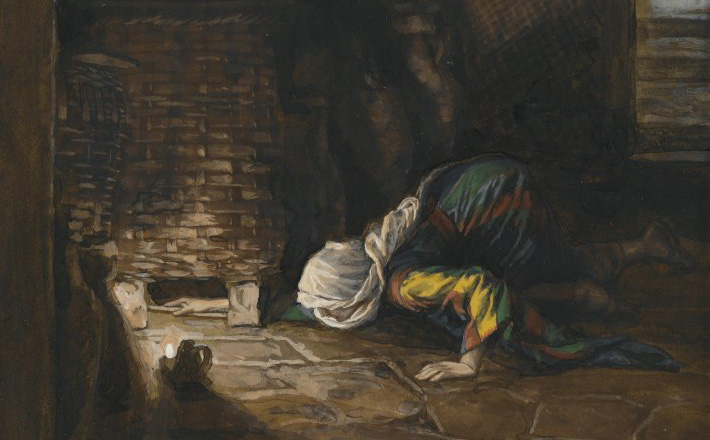Commentary on Psalm 51:1-10
Psalm 51:1-10 provides us, the readers, with an opportunity to think deeply and critically about the complex and ever important issue of sin, about where it originates and how it can be put to death and about its nature and its effects.
The complexity of sin should curb any expectation that the half psalm (or even the entire psalm) will provide a full treatment of the issue. Indeed, the half psalm focuses (in a way that sometimes has led commentators astray) on the divine-human relationship: “Against you, you alone, have I sinned” (51:4a). Within this parameter, the half psalm nevertheless broaches fundamental topics and offers penetrating insight about the radical nature of sin and its effects.
A Biography of Sin
The psalm begins with a petition for God to purge the psalmist’s sin, and this theme dominates the half psalm: “Blot out my transgressions … wash me thoroughly from my iniquity … cleanse me from my sin … purge me with hyssop … wash me … blot out my iniquities” (51:1, 2, 7, 9). Only in the final verse of the reading does the psalm turn in earnest to imagining life after the eradication of sin: “Create in me a clean heart, O God” (51:10a).
The half psalm, in short, is about the final chapter in the story of sin, about its death and exit from its host — the once sinner, now penitent, and soon to be righteous teacher. But just as an eulogy reviews the life of the dead, so too the psalm reviews the biography of sin. In this way, the half psalm presents for eradication the entirety of sin and not only the most recent infraction, sin “not in part but the whole.” One might dare to say that the psalmist presents his sinfulness itself for eradication.
The biography of sin begins early in the life of the host, endures through much of life, and comes to an end only through a radical event equal to the hardiness of sin.
In an intensifying couplet, the psalmist tells of the introduction of sin in his life:
Indeed, I was born in guilt,
and my mother conceived me in sin. (51:5)
This verse should not be confused with a biography of either the psalmist or the mother; it concerns sin and tells of the radical nature of sin in human life: Sin and sinfulness are coeval with human life.
Sin also endures unabated throughout life. “My sin is ever before me,” the psalmist confesses (51:3b). This does not necessarily mean that the psalmist is a committed rebel. He knows what God desires: truth and wisdom in the inwardness of human hearts (51:6), and even acknowledges that God is in the right to judge and punish him (51:4b). The psalmist does not bask in sin but laments it and its effects. Most of all, he laments that his sins and his sinfulness render him an offense to God: “I have done what is evil in your sight” (51:3aβ).
It is with this realization of the radical and persistent nature of sin and its deadly effects that the psalmist approaches God and petitions for God’s mercy, faithfulness, and compassion (51:1). The psalm is an acknowledgment that it takes the divine to put sin to death and to renew life, and the half psalm brings us to the threshold between death and life.
How Sin Dies
The great event of the psalm, which still lies in the petitioned for future, is the death of sin. As we will see, it must be God who puts sin to death and creates new life.
Sin’s death requires the life-giving grace of God. Grace — and faithfulness and compassion — is thus what the psalmist asks for first. To be certain, the repentance of the sinner and ritual actions are required. The psalmist presents himself, his sin, and his sinfulness before God and engages in ritual acts of purging and cleansing, involving perhaps hyssop (51:7) and water. But, ultimately, it is God’s grace that makes these ritual acts of repentance meaningful and efficacious.
Thus, it would not be incorrect to say that the penitent psalmist prays for and simultaneously participates in the divine act of cleansing and purging (51:1, 2, 7, 9). The ritual action is effective because it reflects divine action; and the divine takes action because the penitent prays in faith for God to act. By means of psalm and ritual, the psalm moves the divine to act who in turn imbues the ritual and psalm with life giving vitality. The psalm and the ritual mysteriously bind the penitent and God and reunite the two once separated by sin.
The purgation of sin makes new life possible, and it is new life that seals the death of sin. This too God must do. Thus the psalmist pleads, “Create in me a clean heart, O God” (51:10a).
The Hebrew word for create (br’) has only one subject in all of the Bible: God. God alone creates in this way, and the word refers primarily to the creation of the cosmos: “In the beginning when God created (br’) the heavens and the earth” (Genesis 1:1). Therefore, to use this word to describe the re-creation of the human heart indicates that it must be God who does this and that it is a feat comparable to the creation of the world. The sinful heart must be cleansed. It must, in a sense, also die with sin, so that, in its place, a new heart can be created.
In sum, the psalm paints repentance as a kind of death and a kind of resurrection, not merely reformation but a radical new beginning.
What Is Sin
The half psalm does not speak with specificity about the sin that has so destroyed the psalmist’s being that it needs to die and be re-created. In one sense, the psalm states that all sin is evil in the sight of God (51:4). But the superscription to the psalm identifies the sin as the sin of which the prophet Nathan condemned David in 2 Samuel 12, namely his adulterous affair with Bathsheba and his treacherous murder of her husband, Uriah. The canonical superscription, which binds the psalm to a specific moment in David’s life, connects the act of repentance to specific sins. It reminds us that repentance has to do with particular sins, not simply sin in the abstract.
Create in me a clean heart, O God!


September 11, 2016